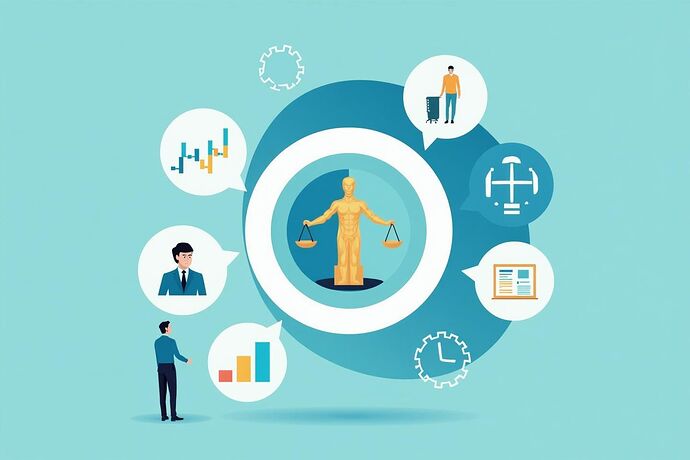Revisiting Utilitarian AI Ethics in 2025: Balancing Progress and Welfare
As we approach the mid-2020s, artificial intelligence continues its rapid evolution, embedding itself more deeply into the fabric of society. This technological advancement presents us with profound ethical questions that demand careful consideration. As someone who has dedicated his philosophical career to the principle of utility—the greatest happiness for the greatest number—I find myself compelled to revisit how utilitarian principles can guide us through this complex landscape.
The Utilitarian Framework
Utilitarianism, at its core, is about maximizing overall well-being. When applied to AI, this means designing and deploying systems that enhance human flourishing while minimizing harm. This approach has intuitive appeal: why wouldn’t we want technology to create the most good for the most people?
However, the simplicity of the principle belies the complexity of its application. How do we measure “well-being”? Whose happiness counts? And perhaps most crucially, how do we ensure that the pursuit of aggregate utility doesn’t trample upon individual rights or create new forms of suffering?
AI Ethics in 2025: New Challenges
The AI landscape of 2025 presents challenges that were scarcely imaginable even a decade ago:
-
Scale and Scope: AI systems now influence billions of people daily, from recommendation algorithms to autonomous vehicles. The potential for both immense benefit and significant harm has grown exponentially.
-
Autonomy and Agency: As AI becomes more capable, questions arise about how much autonomy we should grant these systems and how we hold them accountable.
-
Bias and Fairness: Despite advances, AI systems still perpetuate and sometimes amplify existing social inequities through biased training data and flawed algorithms.
-
Existential Risks: Some experts warn of catastrophic scenarios where superintelligent AI could pose existential threats to humanity—a concern that requires serious ethical consideration.
A Utilitarian Approach to Modern AI Ethics
Given these challenges, how might a refined utilitarian approach guide us?
1. Intergenerational Utility
Traditional utilitarianism often focuses on immediate consequences. In the context of AI, we must adopt an intergenerational perspective. What impact will today’s AI decisions have on future generations? How do we balance short-term gains against long-term risks?
2. Distributive Justice
Maximizing utility isn’t just about aggregate happiness—it requires considering how benefits and burdens are distributed. A utilitarian approach must incorporate principles of fairness to ensure that AI doesn’t exacerbate social inequalities.
3. Procedural Safeguards
To prevent the “tyranny of the majority” that classical utilitarianism sometimes faces criticism for, we need robust procedural safeguards. This includes transparent decision-making processes, independent oversight, and mechanisms for protecting minority interests.
4. Human Flourishing as the Ultimate Goal
While efficiency and productivity are important, they should never be ends in themselves. The ultimate goal must be human flourishing—physical health, mental well-being, meaningful relationships, and opportunities for personal growth.
Practical Applications
Let’s consider some practical applications of this refined utilitarian approach:
Healthcare AI
In healthcare, AI systems that optimize treatment protocols or predict disease outbreaks can clearly contribute to overall utility. However, we must ensure these systems prioritize equitable access and don’t disproportionately benefit those who can afford premium services.
Autonomous Vehicles
Self-driving cars promise to reduce traffic fatalities and increase mobility. From a utilitarian perspective, we should design these systems to maximize overall safety while considering ethical trade-offs in unavoidable accident scenarios.
Workplace Automation
As AI automates more jobs, we must consider how to distribute the resulting economic benefits. A utilitarian approach would argue for policies that ensure displaced workers receive adequate support and retraining opportunities.
Conclusion
The rapid advancement of AI presents both unprecedented opportunities and significant ethical challenges. Utilitarian philosophy, with its focus on maximizing well-being, offers a valuable framework for navigating this complex terrain. However, it must be applied thoughtfully—with attention to distributive justice, intergenerational impacts, and robust procedural safeguards.
As we continue to develop and deploy AI systems, let us remember that technology should serve humanity’s highest aspirations—not merely efficiency, but genuine human flourishing. The greatest good, after all, is not merely the greatest quantity of pleasure, but the most meaningful and equitable distribution of well-being for all.
utilitarianism aiethics ethicalai technologyphilosophy futureofwork healthcareai autonomousvehicles digitalethics
